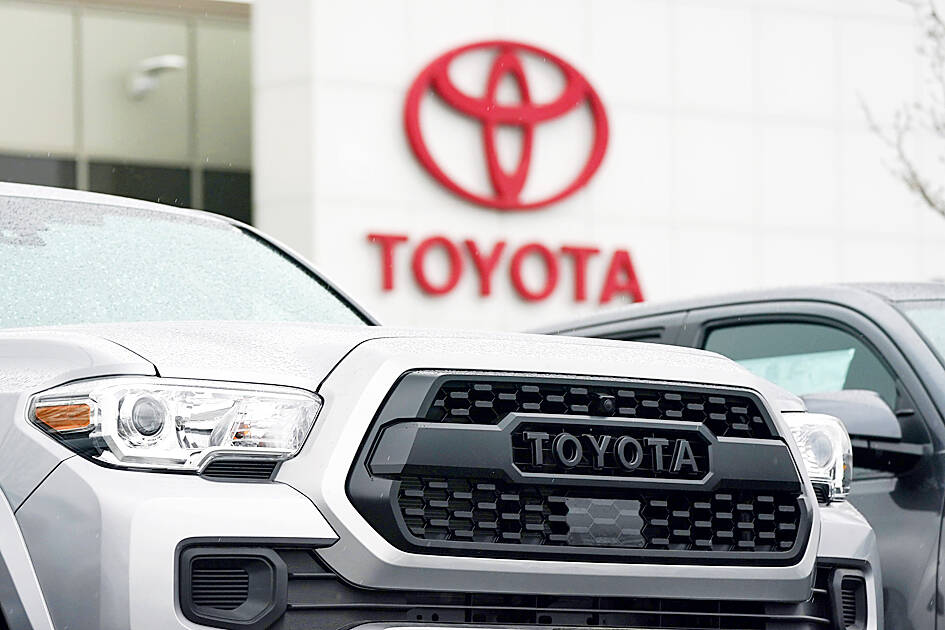Toyota Motor Corp plans to make an all solid-state battery as part of its ambitious strategy for battery electric vehicles (EVs), the company said yesterday, amid mounting criticism Japan’s top automaker needs to do more to fight climate change.
Toyota aims for a commercial solid-state battery as soon as 2027.
Charging time, one of the main drawbacks of electric vehicles, is would be shortened to 10 minutes or less, the company said in a statement.

Photo: AP
It plans to deliver 1.5 million EVs in 2026 by expanding its battery EV lineup and developing technology.
“With the evolution of the vehicle’s operating system, the next-generation battery EV will also enable customization of the ‘driving feel,’ with a focus on acceleration, turning and stopping,” it said.
EV owners usually have charging stations in their homes and keep their cars plugged in overnight to recharge. That is one of the main reasons Toyota has long insisted that hybrids are a better solution. A hybrid recharges as the vehicle runs, but it also has a gasoline engine in addition to an electric motor.
Toyota president Koji Sato has said the company must play catchup after falling behind in the EV sector. The automaker is likely to face harsh criticism on its climate change commitments at a shareholders’ meeting in Toyota, Japan, today.
In its latest announcement, Toyota said it was also working on innovating lithium-ion batteries, the battery type in most EVs, and wants to offer new affordable options.
Toyota says it is committed to a “hydrogen society” and is continuing to work on models powered by hydrogen, including fuel cell vehicles.
Hydrogen is still expensive and usually made using fossil fuels, although it can be made using renewable energy.
Toyota said it is working with various partners to produce cleaner and cheaper hydrogen.
Toyota, which makes the Prius hybrid, Camry sedan and Lexus luxury models, is also working on second-generation biofuels. Biofuels, such as ethanol, are considered more renewable than fossil fuels though they have other drawbacks.

Zhang Yazhou was sitting in the passenger seat of her Tesla Model 3 when she said she heard her father’s panicked voice: The brakes do not work. Approaching a red light, her father swerved around two cars before plowing into a sport utility vehicle and a sedan, and crashing into a large concrete barrier. Stunned, Zhang gazed at the deflating airbag in front of her. She could never have imagined what was to come: Tesla Inc sued her for defamation for complaining publicly about the vehicles brakes — and won. A Chinese court ordered Zhang to pay more than US$23,000 in

Taiwan Semiconductor Manufacturing Co (TSMC, 台積電) yesterday said that its investment plan in Arizona is going according to schedule, following a local media report claiming that the company is planning to break ground on its third wafer fab in the US in June. In a statement, TSMC said it does not comment on market speculation, but that its investments in Arizona are proceeding well. TSMC is investing more than US$65 billion in Arizona to build three advanced wafer fabs. The first one has started production using the 4-nanometer (nm) process, while the second one would start mass production using the

A TAIWAN DEAL: TSMC is in early talks to fully operate Intel’s US semiconductor factories in a deal first raised by Trump officials, but Intel’s interest is uncertain Broadcom Inc has had informal talks with its advisers about making a bid for Intel Corp’s chip-design and marketing business, the Wall Street Journal reported, citing people familiar with the matter. Nothing has been submitted to Intel and Broadcom could decide not to pursue a deal, according to the Journal. Bloomberg News earlier reported that Taiwan Semiconductor Manufacturing Co (TSMC, 台積電) is in early talks for a controlling stake in Intel’s factories at the request of officials at US President Donald Trump’s administration, as the president looks to boost US manufacturing and maintain the country’s leadership in critical technologies. Trump officials raised the

From George Clooney to LeBron James, celebrities in the US have cashed in on tequila’s soaring popularity, but in Mexico, producers of the agave plant used to make the country’s most famous liquor are nursing a nasty hangover. Instead of bringing a long period of prosperity for farmers of the spiky succulent, the tequila boom has created a supply glut that sent agave prices slumping. Mexican tequila exports surged from 224 million liters in 2018 to a record 402 million last year, according to the Tequila Regulatory Council, which oversees qualification for the internationally recognized denomination of origin label. The US, Germany, Spain,